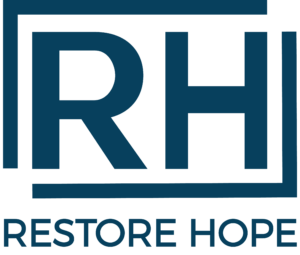 Little Rock, Arkansas – Restore Hope is transforming lives across Arkansas and the nation by helping families in crisis access the right support at the right time. That mission will become even stronger thanks to a new collaboration with SHARE HIE, Arkansas’s statewide health information exchange.
Little Rock, Arkansas – Restore Hope is transforming lives across Arkansas and the nation by helping families in crisis access the right support at the right time. That mission will become even stronger thanks to a new collaboration with SHARE HIE, Arkansas’s statewide health information exchange.
Restore Hope will begin receiving real-time Emergency Department (ED) and Inpatient (IP) notification reports through SHARE HIE for participants being served by a Restore Hope initiative. These alerts allow Restore Hope’s care coordinators, advocates, and community partners to identify when a participant has an acute medical event and follow up with proper resources, support, and stabilization services in a timely manner.
How It Will Work
When someone who is enrolled in a Restore Hope initiative is admitted to or discharged from a hospital, SHARE HIE securely notifies Restore Hope and community-based care teams so that they will be able to:
Reach out to the participant and their family
Assess immediate needs (housing, food, transportation, safety, mental health)
Connect the participant to services through HopeHub, Restore Hope’s collaborative case-management system
Coordinate with hospitals, clinics, behavioral health providers, and other local partners
Reduce the chance of avoidable readmissions or crises
Ensure the participant’s support network is fully informed
This real-time visibility bridges the gap between clinical healthcare and community-based care, empowering local service providers who are in HopeHub to offer timely and effective interventions.
“Real-time ED and inpatient notifications from SHARE HIE will be a game-changer. When a family experiences a crisis, minutes matter. These alerts allow our team to respond quickly, wrap support around the situation, and make sure no one falls through the cracks.” — Paul Chapman, Executive Director, Restore Hope
Why It Matters
Restore Hope serves families facing complex challenges: homelessness, foster-care involvement, poverty, legal issues, behavioral health needs, and more. These families often experience frequent acute-care visits, but community service providers have historically lacked information about hospital encounters.
With SHARE HIE’s notifications, local care teams can:
Act faster during moments of crisis
Strengthen care coordination across counties and agencies
Track outcomes and measure impact
Provide wraparound support that improves health, stability, and overall well-being
“The SHARE HIE notifications give service providers in HopeHub the ability to reach families exactly when they need help the most. When an emergency happens, a care team can step in and provide stability, resources, and hope.”— Karen Phillips, Chief Operations Officer, Restore Hope
“Technology should remove barriers, not create them. By connecting with SHARE HIE, we can create a seamless bridge between hospitals and community support systems to drive better outcomes.” — Sarah Littleton, Chief Technology Officer, Restore Hope
A Model for the Future
The partnership between SHARE HIE and Restore Hope demonstrates how health data + community support can work hand-in-hand. By connecting clinical events with real-world community action, Arkansas is building a more responsive, people-centered system—one that promotes stability, reduces crisis cycles, and empowers families to thrive.
 About Restore Hope
About Restore Hope
Restore Hope is a mission-driven nonprofit helping communities in Arkansas and across the nation create transformational change. Through the HopeHub case management platform, local service providers—schools, nonprofits, state agencies, healthcare providers, faith communities, and courts—have the tools to work as one coordinated team. Statewide initiatives, such as 100 Families, have already led to family reunifications, a reduced need for foster care, and stronger family stability.
Learn more: https://www.restorehope.io/



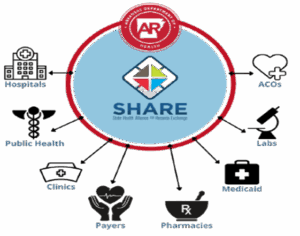 Because of your dedication to connecting, sharing, and using data, Arkansas patients are benefiting in meaningful and measurable ways every single day. Together, we are building a more connected healthcare ecosystem that places patients at the center of care and empowers providers with timely, actionable information.
Because of your dedication to connecting, sharing, and using data, Arkansas patients are benefiting in meaningful and measurable ways every single day. Together, we are building a more connected healthcare ecosystem that places patients at the center of care and empowers providers with timely, actionable information.

 A Unified Network of Women’s Health Providers
A Unified Network of Women’s Health Providers Improving Maternal Health Through Better Information
Improving Maternal Health Through Better Information A Shared Vision for Healthier Communities
A Shared Vision for Healthier Communities About Unified Women’s Healthcare:
About Unified Women’s Healthcare: About Women’s Health Associates of NWA:
About Women’s Health Associates of NWA:  About Conway Women’s Health Center:
About Conway Women’s Health Center: 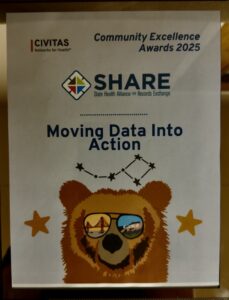 This recognition highlights SHARE HIE’s leadership in advancing interoperability and data exchange across Arkansas’s healthcare ecosystem. As the state’s only statewide Health Information Exchange (HIE), SHARE connects more than 4,000 healthcare organizations and 128 hospitals, representing thousands of providers. Through real-time exchange of clinical data, including ADT (admission, discharge, transfer) notifications, laboratory results, radiology reports, progress notes, discharge summaries and continuity of care documents (CCDs), SHARE empowers providers to make informed decisions at the point of care. From hospitals and primary care clinics to behavioral health providers, EMS agencies, and payers, SHARE ensures that the right information is accessible when and where it’s needed most.
This recognition highlights SHARE HIE’s leadership in advancing interoperability and data exchange across Arkansas’s healthcare ecosystem. As the state’s only statewide Health Information Exchange (HIE), SHARE connects more than 4,000 healthcare organizations and 128 hospitals, representing thousands of providers. Through real-time exchange of clinical data, including ADT (admission, discharge, transfer) notifications, laboratory results, radiology reports, progress notes, discharge summaries and continuity of care documents (CCDs), SHARE empowers providers to make informed decisions at the point of care. From hospitals and primary care clinics to behavioral health providers, EMS agencies, and payers, SHARE ensures that the right information is accessible when and where it’s needed most.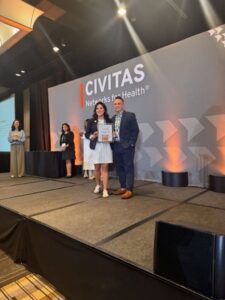 The SHARE HIE team firmly believes that true progress in healthcare happens through collaboration, communication, and partnership. By actively engaging with hospitals, clinics, behavioral health providers, long-term care facilities, payers, and community organizations, SHARE fosters an environment of shared learning and trust. The team prioritizes listening to partners’ needs, understanding their challenges and tailoring solutions that deliver real value. Whether it’s enhancing clinical workflows, improving data quality, or supporting interoperability goals, SHARE’s success is built on the strength of relationships and a shared commitment to improving health outcomes across Arkansas.
The SHARE HIE team firmly believes that true progress in healthcare happens through collaboration, communication, and partnership. By actively engaging with hospitals, clinics, behavioral health providers, long-term care facilities, payers, and community organizations, SHARE fosters an environment of shared learning and trust. The team prioritizes listening to partners’ needs, understanding their challenges and tailoring solutions that deliver real value. Whether it’s enhancing clinical workflows, improving data quality, or supporting interoperability goals, SHARE’s success is built on the strength of relationships and a shared commitment to improving health outcomes across Arkansas.

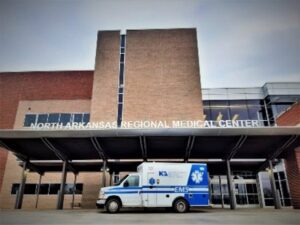

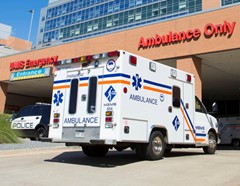
 Looking Ahead
Looking Ahead Through the integration, ADT (Admission, Discharge, Transfer) notifications, laboratory results, radiology reports, progress notes, and CCD (Continuity of Care Documents) flow directly from the nursing homes into SHARE. Access Medical Clinic Arkansas LTC providers are documenting when they see a patient in their Athena One EMR, which is fully integrated with SHARE at their respective facilities they serve. This ensures that providers have a complete, up-to-date view of each resident’s health status without the delays and information gaps that often come with transitions of care.
Through the integration, ADT (Admission, Discharge, Transfer) notifications, laboratory results, radiology reports, progress notes, and CCD (Continuity of Care Documents) flow directly from the nursing homes into SHARE. Access Medical Clinic Arkansas LTC providers are documenting when they see a patient in their Athena One EMR, which is fully integrated with SHARE at their respective facilities they serve. This ensures that providers have a complete, up-to-date view of each resident’s health status without the delays and information gaps that often come with transitions of care. One of the most powerful features of this partnership is real-time event notifications. When a nursing home or rehab patient visits the emergency department (ED), is admitted to the hospital (IP), or returns to the facility, SHARE alerts the provider. This immediate visibility allows the provider to schedule timely follow-ups, often the next day, ensuring continuity of care and reducing the risk of complications.
One of the most powerful features of this partnership is real-time event notifications. When a nursing home or rehab patient visits the emergency department (ED), is admitted to the hospital (IP), or returns to the facility, SHARE alerts the provider. This immediate visibility allows the provider to schedule timely follow-ups, often the next day, ensuring continuity of care and reducing the risk of complications. About Access Medical Clinic Arkansas LTC: Access Medical Clinic is a leading family practice and urgent care providing a complete complement of care and treatment options for patients throughout Arkansas, Alabama, Oklahoma, Tennessee, Texas, Georgia, North Carolina, and Indiana.
About Access Medical Clinic Arkansas LTC: Access Medical Clinic is a leading family practice and urgent care providing a complete complement of care and treatment options for patients throughout Arkansas, Alabama, Oklahoma, Tennessee, Texas, Georgia, North Carolina, and Indiana. Little Rock, Arkansas- July 2025 The State Health Alliance for Records Exchange (SHARE), Arkansas’ only statewide health information exchange housed under the Arkansas Department of Health, is proud to announce a landmark integration with the U.S. Department of Veterans Affairs (VA) via the eHealth Exchange—the nation’s largest query-based health information network, connecting federal agencies and healthcare organizations for secure, interoperable data exchange.
Little Rock, Arkansas- July 2025 The State Health Alliance for Records Exchange (SHARE), Arkansas’ only statewide health information exchange housed under the Arkansas Department of Health, is proud to announce a landmark integration with the U.S. Department of Veterans Affairs (VA) via the eHealth Exchange—the nation’s largest query-based health information network, connecting federal agencies and healthcare organizations for secure, interoperable data exchange. About the U.S. Department of Veterans Affairs – Health Care for Veterans: The Veterans Health Administration (VHA) is the nation’s largest integrated healthcare system, delivering care to over 9.1 million enrolled Veterans annually. Its network includes 1,380 healthcare facilities—comprising 170 medical centers and 1,193 outpatient clinics—dedicated to providing accessible, high-quality care to Veterans across the country.
About the U.S. Department of Veterans Affairs – Health Care for Veterans: The Veterans Health Administration (VHA) is the nation’s largest integrated healthcare system, delivering care to over 9.1 million enrolled Veterans annually. Its network includes 1,380 healthcare facilities—comprising 170 medical centers and 1,193 outpatient clinics—dedicated to providing accessible, high-quality care to Veterans across the country.
 “Connecting to SHARE has expanded our ability to care for the whole patient,” said Holly Monroe, Director of the Father Bob Allen Charitable Clinic. “We now have insights into their recent hospital visits, labs, and medications—information that helps us avoid duplication and provide more effective, continuous care, especially for those with chronic conditions.”
“Connecting to SHARE has expanded our ability to care for the whole patient,” said Holly Monroe, Director of the Father Bob Allen Charitable Clinic. “We now have insights into their recent hospital visits, labs, and medications—information that helps us avoid duplication and provide more effective, continuous care, especially for those with chronic conditions.” About Father Bob Allen Charitable Clinic: Father Bob Allen Charitable Clinic is a nonprofit medical clinic that serves uninsured low-income patients in Union County, AR. We provide primary medical care, routine lab work, medication assistance, diabetes education, weight loss programs, annual wellness visits, EKGs, and more. Our prescription assistance program is available to both clinic and non-clinic patients, therefore, we can assist qualifying adults with a prescription program no matter their provider.
About Father Bob Allen Charitable Clinic: Father Bob Allen Charitable Clinic is a nonprofit medical clinic that serves uninsured low-income patients in Union County, AR. We provide primary medical care, routine lab work, medication assistance, diabetes education, weight loss programs, annual wellness visits, EKGs, and more. Our prescription assistance program is available to both clinic and non-clinic patients, therefore, we can assist qualifying adults with a prescription program no matter their provider.
 LHC Group operates a comprehensive network of home health, hospice, and community-based service locations across Arkansas. These facilities are strategically situated to serve patients statewide, including in cities such as Little Rock, Hot Springs, Fort Smith, Jonesboro, Conway, Pine Bluff, Benton, Fayetteville, Springdale, Searcy, El Dorado, Texarkana, Harrison, Batesville, Russellville, Mountain Home, Camden, and Paragould.
LHC Group operates a comprehensive network of home health, hospice, and community-based service locations across Arkansas. These facilities are strategically situated to serve patients statewide, including in cities such as Little Rock, Hot Springs, Fort Smith, Jonesboro, Conway, Pine Bluff, Benton, Fayetteville, Springdale, Searcy, El Dorado, Texarkana, Harrison, Batesville, Russellville, Mountain Home, Camden, and Paragould. About LHC Group, Inc.- LHC Group, Inc. is a leading national provider of in-home healthcare services, offering quality, value-based care to patients primarily within the comfort and privacy of their homes. Founded in 1994 as a single home health agency in small-town America, LHC Group has grown to deliver home health, hospice, and home- and community-based services across 38 states and the District of Columbia, reaching 68 percent of the U.S. population aged 65 and older.
About LHC Group, Inc.- LHC Group, Inc. is a leading national provider of in-home healthcare services, offering quality, value-based care to patients primarily within the comfort and privacy of their homes. Founded in 1994 as a single home health agency in small-town America, LHC Group has grown to deliver home health, hospice, and home- and community-based services across 38 states and the District of Columbia, reaching 68 percent of the U.S. population aged 65 and older.